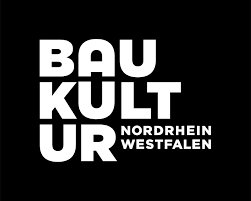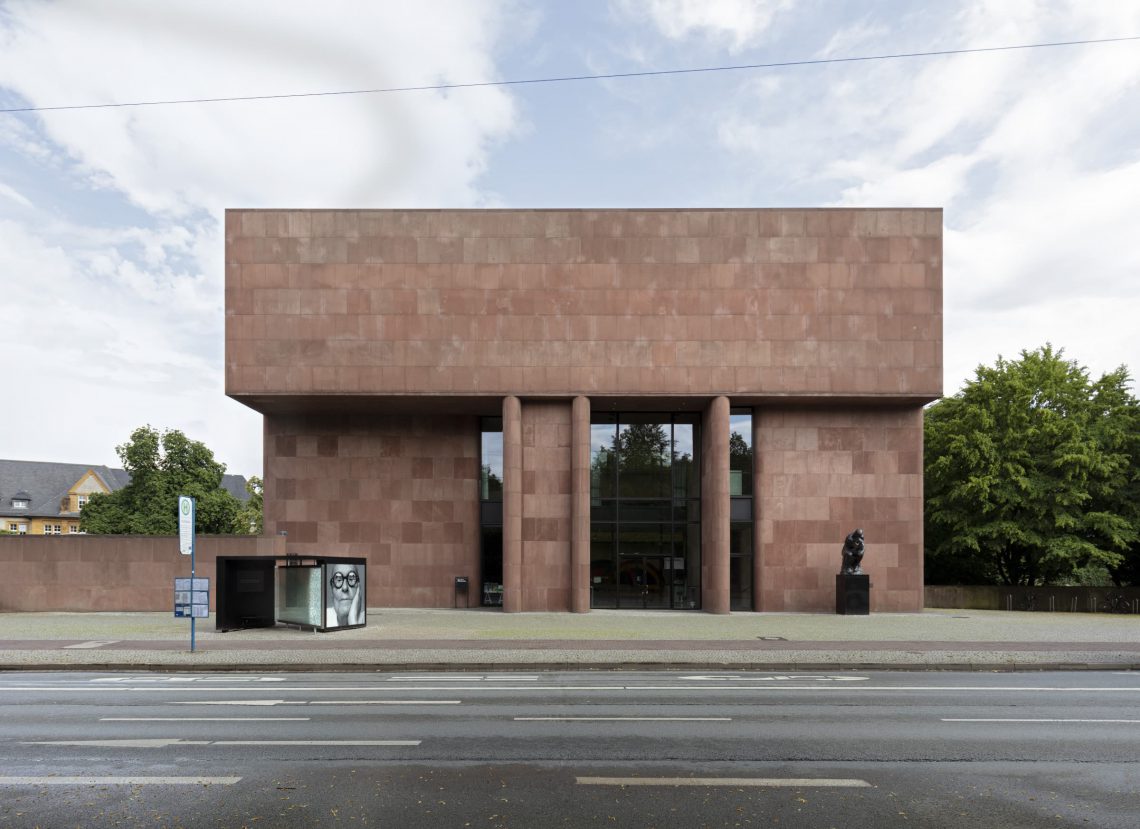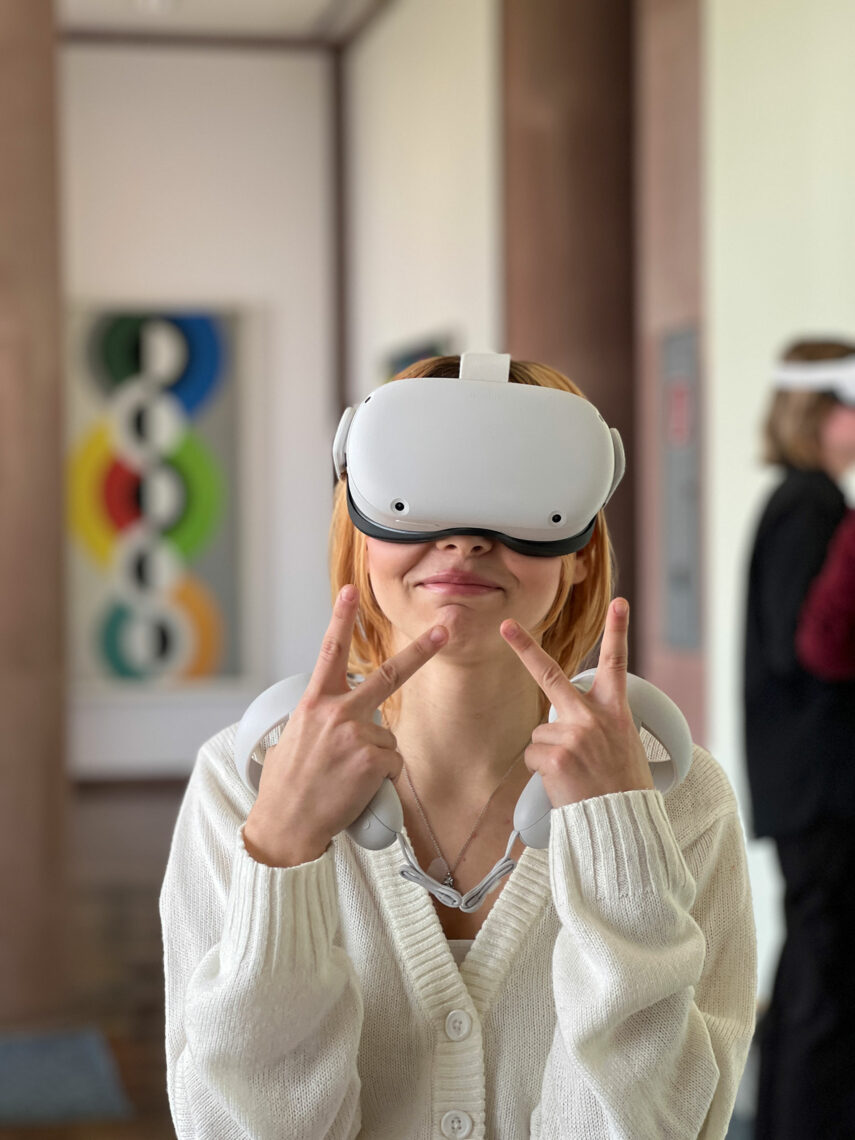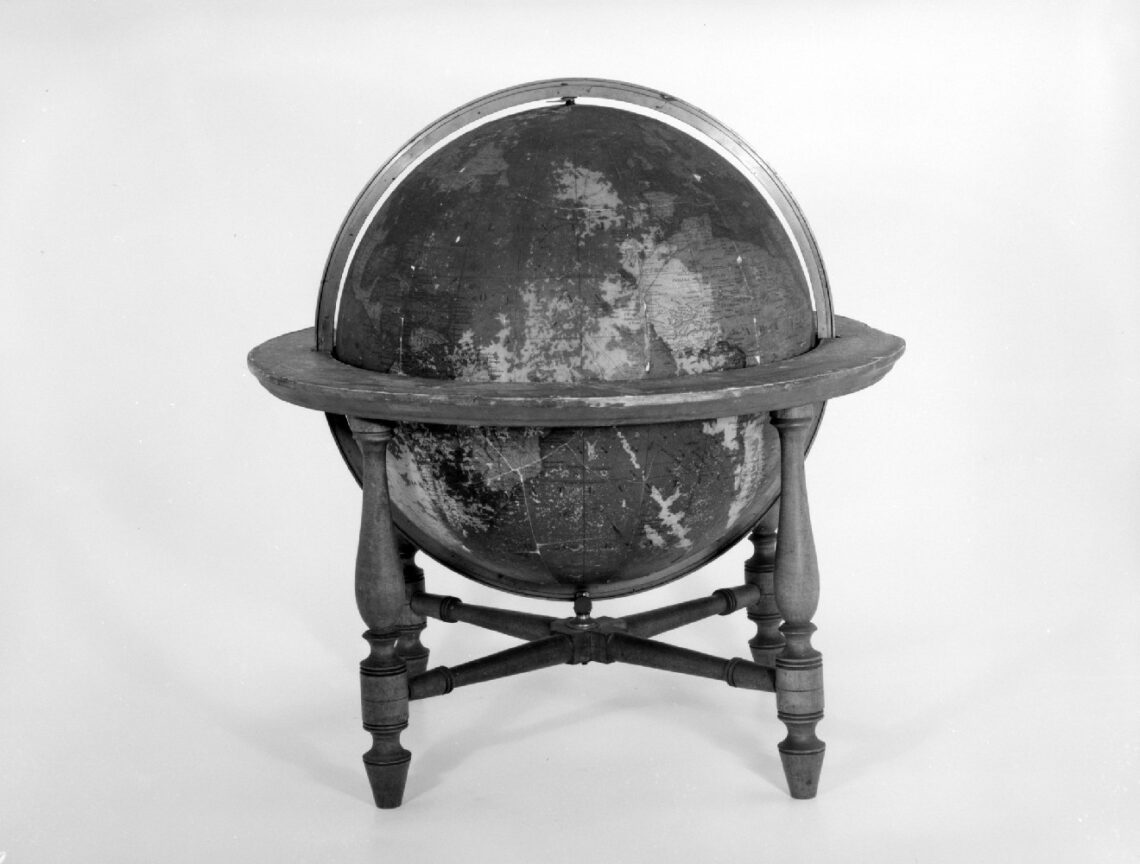Architecture Symposium Part III
Climate box versus climate crisis
Fit for the future: the climate-neutral museum
October 27 + 28, 2023
Climate, art business, cultural tourism – how can it continue? How do museums become climate neutral? How can sustainability in the exhibition industry be implemented and lived in the future in construction, in operational processes, in the understanding of the exhibition industry itself? Will visitors come exclusively by public transport in the future and will parking spaces be abolished? How important will air conditioning be in the future, how will exhibitions be created with less transportation, and what restoration regulations need to be re-discussed? Climate box versus climate crisis!
Come by and join the discussion!
You can find a playlist with the recordings of all presentations on our YouTube-Channel.
Blog posts on each keynote and the corresponding recording are linked below in the biographies.
We meet in Part III

Chairwoman of the Bündnis 90/Die Grünen parliamentary group in the Bundestag
Britta Haßelmann has been one of the two chairs of the Bündnis 90/Die Grünen parliamentary group since December 2021. Previously, she was the parliamentary group’s First Parliamentary Secretary from 2013 to 2021. In 2005 she was elected to the German Bundestag for the first time, and from 2000 to 2006 she was the state chairwoman of the Green Party in North Rhine-Westphalia. Since graduating with a degree in social work, Britta Haßelmann has lived in Bielefeld, where she also has her constituency.
She will give the welcoming speech for the third part of the symposium (video message).

Head of the Sustainability in Culture and Media Network
He has held this position since the summer of 2020. The network is funded by the Federal Government Commissioner for Culture and the Media (BKM). In 2009, he founded the pan-European Green Music Initiative (GMI), an independent, cross-industry think tank to inspire people in the music festival and event industry to make their operations more sustainable and smarter. The non-profit initiative now brings together more than 350 festivals and 500 venues across Europe, reaching more than 3 million young European women through its activities. GMI acts as a cross-sector innovation and research agency for the European music and entertainment industry. As project manager of the EE MUSIC project, he was responsible for more than 60 workshops held in 27 European countries to encourage festivals, clubs and venues to address the issue of energy efficiency strategically. Jacob Sylvester Bilabel is also a member of the German technical mirror committee for the new ISO 20121 standard for sustainability in event management. In 2016, he was appointed by the German Federal Ministry for Economic Affairs and Energy as an expert for innovation processes in the creative sector. In 2017, he became an ambassador for the European Take A Stand project, which raises awareness of cultural values among young Europeans. In 2018, he became part of a European research consortium that develops and produces hydrogen fuel cells for festivals and events.
Currently, Jacob Bilabel as subject1 together with the company klimaktiv has been commissioned by the AdHoc Ag of the National Conference of Ministers of Education and Cultural Affairs to develop nationwide climate accounting standards for culture. The release is planned for November 2023.
He leads us through the discussions as a moderator.
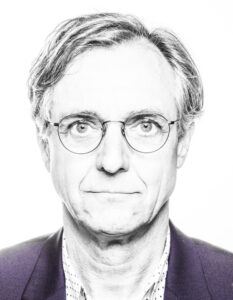
Professor for Urban Design at the HafenCity University Hamburg
The architect and urban planner has held the professorship since 2008. There he is responsible for the conception and management of the interdisciplinary master program Urban Design. In his teaching, research and practice, he is interested in the interrelationships of the contemporary city, whose diagrammatic description he makes the subject of inter- and transdisciplinary knowledge production and whose future scope he tests in procedures of relational practice, so-called ‘real laboratories’. His teaching and lecturing activities have taken him to Tokyo, Johannesburg, Cairo, Medellín, Sao Paulo, Shanghai, and most recently, as Graham Willis Professor, to Sheffield. He is a member of the North Rhine-Westphalian Academy of Sciences and Arts.
He will give the keynote address:
The city, the box, the art and the climate.
Attempt at a relational reassembly
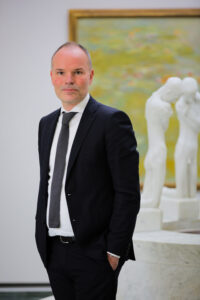
Director of the Museum Folkwang in Essen
Peter Gorschlüter was born in Mainz in 1974 and has been director of the Museum Folkwang since July 2018. After studying art history and media theory, Gorschlüter was a research assistant at the Kunsthalle Düsseldorf from 2002 to 2007. From 2008 to 2010 he worked as a curator at Tate Liverpool, where he headed the Collection and Exhibitions Department. In 2010 Gorschlüter was co-curator of the Liverpool Biennial. From 2010 to 2018 he was deputy director at the MMK Museum für Moderne Kunst Frankfurt am Main. In 2021 he was awarded an honorary professorship for “Art and the Public” at the Folkwang University of the Arts in Essen. Together with Regina Selter (Museum Ostwall/Dortmunder U), he is the spokesperson for the network of 21 RuhrKunstMuseen.
In order to become climate-neutral as a museum, a holistic rethinking, responsible action and investments in technical innovations are required. If museums want to continue to serve as role models for society, they must combine the energy-intensive preservation of cultural heritage, visitor-intensive museum operations, and international collaboration with future-oriented sustainability management. The keynote lecture will provide an insight into programmatic, organizational and technical fields of action in the area of sustainability, using the example of the Museum Folkwang.
He will give the keynote address:
The path to a climate-friendly museum

Professor of Art and Education at the Academy of Fine Arts Vienna
Elke Krasny researches on issues of care, social and ecological justice, transnational feminisms, and memory work in art, architecture, urbanism, and curatorial practice. Your exhibition Hands-On Urbanism. The Right to Green was shown at the Venice Biennale in 2012. With Angelika Fitz she curated Critical Care. Architecture and Urbanism for a Broken Planet (2019). The exhibition Yasmeen Lari. Architecture for the Future (2023) she curated with Angelika Fitz and Marvi Mazhar.
With Lara Perry, she edited the two volumes Curating with Care and Curating as Feminist Organizing, published by Routledge in 2023. 2022 she published The modern museum as an Anthropocene institution. For Feminist Curation in the Age of Mass Extinction.
She will be giving the keynote address:
Curating as Care Work: Of the Museum Climate in Planetary Interdependencies and Cultural Imaginaries.
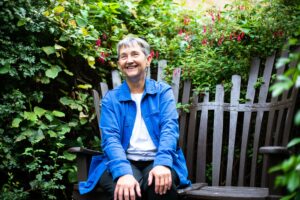
Curator, writer, broadcaster and currently Director Emerita at the Tate Modern
Frances Morris became Director Emerita at the Tate Modern, after leading the institution as Director for 7 years. Frances has made many exhibitions, publications, and public programmes including acclaimed retrospectives of Louise Bourgeois, Yayoi Kusama, and Agnes Martin, most recently co-curating Hilma Af Klint & Piet Mondrian: Forms of Life. As Director of Collections, International Art from 2006 to 2016 Frances led the transformation of Tate’s International Collection, strategically broadening and diversifying its international reach and representation, as well as bringing photography, moving image and live art into the institution for the first time through acquisitions, displays and exhibitions. Since 2019, Frances has been championing Tate’s responses to the climate and environmental crisis, exploring how cultural institutions can best respond and adapt to the complex planetary and societal impacts of the crisis. As Board member of CIMAM Frances was the founding chair of Cimam’s Sustainability Working Group until November 2022.
She gives the lecture:
Rewilding the white cube: the role of art museums in addressing climate emergency
(Rewilding the white cube: die Rolle der Kunstmuseen bei der Bewältigung des Klimanotstandes)
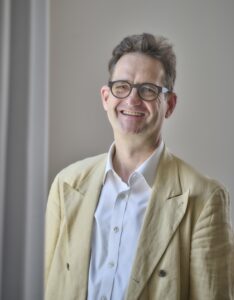
Director of the Department of Modern and Contemporary Art History at the University of Bern and Dean of the Faculty of Philosophy and History
Prof. Dr. Peter J. Schneemann has held the directorship since 2001 and the deanship since summer 2023. He currently leads the research projects Mediating the Ecological Imperative and Publics of Art. His research interests include methodological issues in dealing with contemporary art, perspectives on ecology, the education and identity formation of artists, historiographies of Abstract Expressionism, and cultural-political discourses since the 18th century.
He will give the keynote address:
Exhibiting and preserving as toxic paradigms. Can cultural institutions negotiate the environmental crisis?
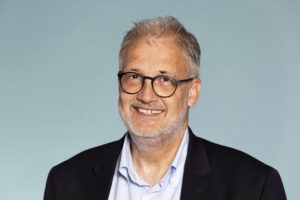
Director of the Rathgen Research Laboratory of the National Museums in Berlin, Prussian Cultural Heritage Foundation.
Stefan Simon has held this position since 2005. Trained as a conservation scientist, Stefan Simon earned his doctorate in chemistry from Ludwig Maximilian University in Munich, Germany, studying the weathering and conservation of marble. In the intergovernmental organization ICCROM, the “International Centre for the Study of the Preservation and Restoration of Cultural Property,” he represented Germany on the Council and served as its Vice President.
As founding director of the Institute for the Preservation of Cultural Heritage (IPCH) and director of Global Cultural Heritage Initiatives at Yale University, New Haven, CT (2014-2019), Stefan Simon has primarily prioritized the development of sustainable preservation strategies, driven by the climate crisis and “green museum” debates. He has co-initiated a series of events of the same name in Germany since 2010.
From 2001-2005, he was head of the Building Materials Section at the Getty Conservation Institute in Los Angeles. Stefan Simon has been an honorary professor at X’ian Jiaotong University (PR China) since 2009, and at TU Berlin since 2013. He is the author and co-author of more than 150 publications in the field of “Heritage Science”.
He will give the keynote address:
Look up – the road to a green museum

Ministerialrat Ralph Zinnikus, Ministry of Culture and Science of the State of North Rhine-Westphalia,
Unit 416, New Cultural Facilities, Sustainability
Ralph Zinnikus trained as a bookseller and then studied German and history at the University of Cologne. He then became a teacher of German and history, a teacher trainer and principal in Mönchengladbach. Since 2012, he has been head of the department for further education and culture at the Düsseldorf district government. Since the beginning of 2022, Zinnikus has been head of unit for the development of new cultural institutions and sustainability in culture at the Ministry of Culture and Science of the State of North Rhine-Westphalia. Also since 2022, he has been acting head of the theater/dance department.
He will give the keynote address:
Peace with Gaia – Perspectives, possibilities and limits of cultural institutions in the sustainability transformation process.
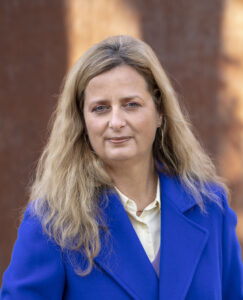
Director of the Kunsthalle Bielefeld
Since February 2020, art historian Christina Végh (*1970 Zurich) has been director of Kunsthalle Bielefeld. Previously, she directed the Kestner Gesellschaft in Hanover from 2015, and was director of the Bonner Kunstverein from 2004 to 2014. Her first station after her studies at the University of Zurich (art history, ethnology, philosophy) and a stay at the University of California Santa Cruz, was the Kunsthalle Basel, where she worked as curator from 2000 to 2004. Végh has curated exhibitions with Monica Bonvicini, Monika Baer, John Baldessari, Rita McBride, Haegue Yang, Charline von Heyl, Annette Kelm, James Richards, Franz Erhard Walther or Christopher Williams, among others, and is also responsible for extensive group exhibitions such as “Where Art Can Happen. The Early Years of Cal Arts” (co-curator Philipp Kaiser) or “Made in Germany Three” and published in corresponding catalogs. Végh is active in numerous committees and juries, including in 2017 as a guest juror of the Wolfgang Hahn Prize, Ludwig Museum Cologne or at Pro Helvetia as a member of the Art Biennale jury (2015-2018), and since 2018 she has been a member of the jury of the Justus Bier Prize. From 2008-2012 Végh was involved in the board of the Arbeitsgemeinschaft der deutschen Kunstvereine (AdKV). In 2010, Végh was awarded a prize for art and architecture education by the Swiss Arts Commission of the Federal Office of Culture.
She will welcome us on each day of the symposium with an introduction and moderates discussion sessions.
Click here for her introductory blog post “Kunsthalle Bielefeld – developing for the 21st century: renovation/expansion”.
The symposium is sponsored and supported by:

